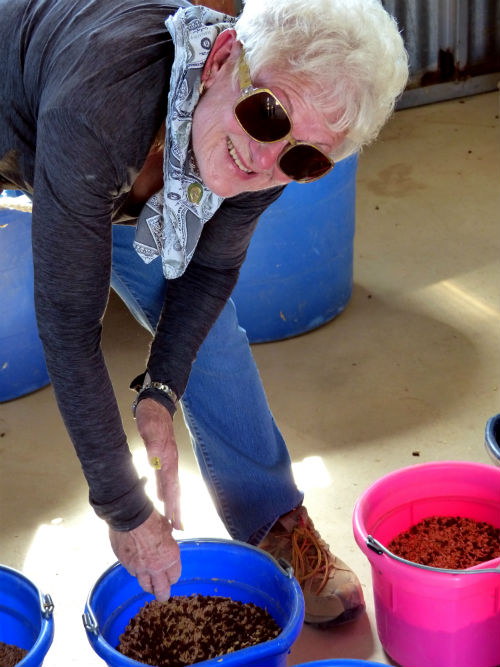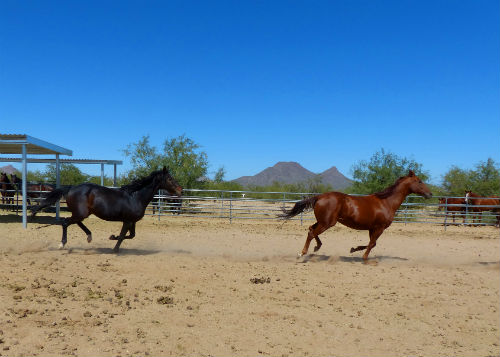By: Erin Shea,
@BH_ESheaWith a place in her heart for horses giving it their all on the track, trainer Patti Shirley made an important announcement when she was interviewed after her trainee Russian Elite won the featured race of the day Dec. 21, 2004 at Sunland Park. With a captive audience, Shirley announced she was going to start an aftercare organization. As soon as the interview was over, she already had her first horse.
"By the time I was winding down my career in training, I was really listening to what was going on in aftercare," she said. "I just thought, 'This is the niche for me, this is what I need to do.'"
Shirley and her late husband Dale Shirley (the former manager of Rillito Racetrack) had a 120-acre farm outside of Tucson that they previously used for breeding and training their own Thoroughbreds. The facility made the perfect location for her new Equine Encore Foundation to help retired racehorses. Using knowledge from her previous career as a legal secretary, she set up her own nonprofit and was off and running in 2005.
The first retired runner brought back to her farm was a Quarter Horse named Rocket On Sound, who arrived Jan. 7, 2005. That same day, they received their first Thoroughbred, stakes winner Oh Gracie. Now 22 years old, Oh Gracie is still at the farm, while Rocket On Sound was adopted out in 2008.
"In the beginning we started adopting them out, but it made it difficult because some of the horses have injuries that make it so they can't go on and do something else," Shirley said. "And if you get a person who is a good rider who can handle a Thoroughbred, they want a horse who can do something. One year I adopted out six horses and I took four of them back, so (I decided), 'I'm not going to do this.'"

Patti Shirley mixes grain for her herd at Equine Encore. Photo: Diane C. Maroscia
Shifting the focus of Equine Encore to that of a sanctuary proved a rewarding but expensive endeavor.
"It's a labor of love and it's just too bad that it's an expensive labor of love," Shirley said of the organization, currently home to 79 horses.
"It's not that I choose not to adopt them out. They all have critical injuries from their years in racing and they can't go on to other careers—those are the ones I always take. I really have a soft spot in my heart for them because they earned their retirement. I don't have any grade 1 winners, but most every horse on my place earned over $100,000... and these are the ones that I love."
A few of her notable past residents include a multiple stakes winner and earner of more than $840,000, Gulchrunssweet, and 1999 Arkansas Derby (G2) runner-up Torrid Sand. Currently the farm is home to grade 3-placed Honour the Deputy, $265,000-earner Mr. Bossy Pants, and Ghostly Dance, who made 70 starts in seven seasons, among others.
While the horses at Equine Encore are not famous, Shirley knows they're special to their former racetrack connections. Given her years on the local circuit, she understands that racing is a business, but she also knows how much trainers and grooms care about the horses in their care, which she's seen first hand from those who visit Equine Encore.
"A trainer came down from Turf Paradise and she was looking around and she said, 'What's that horse's name?' And I said 'His name is Domingo Juan.' And she burst into tears and said she trained that horse, he was claimed away from her, and she didn't know what happened to him," Shirley recalled of one visitor.
"The trainers really care about their horses. The trainers and the grooms and the exercise riders form bonds with them, and they really do care about them—there just isn't enough money to support all of them."

Horses at Equine Encore Foundation near Tucson, Ariz. Photo: Diane C. Maroscia
Shirley, who earned an award of merit in 2015 from Thoroughbred Charities of America for her work at Equine Encore, wants to help as many horses as possible but is limited by costs associated with taking care of a large, aging herd. Although Equine Encore is a Thoroughbred Aftercare Alliance-accredited organization and does receive other grants—from organizations such as Thoroughbred Charities of America, the California Retirement Management Account, and Second Call of Turf Paradise—the nonprofit still relies on donations from racing fans and horse lovers.
"The biggest thing for us is raising money to put food on the table. The only thing I dislike about being a sanctuary is that you just reach a saturation point and there's just so many horses that out there that need help," she said.
"On average we lose one or two horses a year, and they are quickly replaced. I can't really make our organization any bigger... with that many horses, (at) vaccination time, it's thousands of dollars. Everything is expensive when you've got that many horses."




